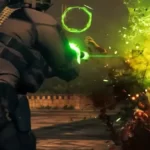In a recent interview with The BurntNetwork, Mohammed Alavi, former developer at Infinity Ward and Respawn Entertainment, shed light on the development process for Call of Duty: Modern Warfare 2 and the Titanfall series. During the conversation, Alvi revealed an untold story of the internal cancellation of Titanfall 3 at Respawn Entertainment, attributing it to the massive success of PUBG and the subsequent battle royale craze.

Alavi revealed that Titanfall 3 had been in active development for ten months, with the team making significant progress on the project. However, due to the sudden explosion of the battle royale genre after the release of PUBG, it was decided to rework the game project, which eventually became Apex Legends.
Following the release of Titanfall 2, which performed moderately but did not achieve overwhelming success, the team at Respawn Entertainment set out to develop its sequel. “We worked very hard on game for 10 months,” Alvi explained. “We had new technology, multiple missions in progress, and a first playable build that had the potential to exceed or at least match its predecessors. But it’s important to note that this was only an incremental improvement. It Wasn’t revolutionary. And that’s the key, isn’t it?”
Alvi discussed the multiplayer team’s struggles with player retention, revealing that while there was a dedicated fanbase for Titanfall 2’s multiplayer, it was relatively small. Many players praised the multiplayer experience but felt overwhelmed by its intensity and eventually burned out. “It’s turned up to 11, and they burn through it quickly,” Alavi explained. They may think it’s great multiplayer, but it’s not something they can play consistently for years.”
ALSO READ: Final Fantasy 7 Rebirth Development Update
While Respawn Entertainment was searching for new ideas to address this issue, the unexpected release and massive popularity of PUBG had a significant impact on their plans. Many of the developers at Respawn Entertainment started out playing PUBG and tried to incorporate some of its concepts into a new multiplayer mode for the game. This experiment quickly became Apex Legends.
“Alex Roycewicz started playing PUBG,” Alvi recounted, and then Geoff started playing PUBG. He designed the battle royale map with the game class.” He continued, “During our Friday Night Fights, the number of players was down to about 10 people – just enough to test things out with the designers and a few artists. But then Apex Legends launched, and the next Friday Night Fights, we had a 100-player lobby that stayed until 9 p.m…. and it went on like that for two months.”
According to Alavi, when the team reunited after the holiday break, they collectively decided to stop development on the game and focus their attention on a new battle royale project. The unexpected success and positive reception of their prototype during Friday Night Fights ultimately influenced this pivotal decision.
It’s worth noting that the cancellation of Titanfall 3 doesn’t mean the franchise is permanently over. Respawn Entertainment has expressed its interest in further exploring the Titanfall universe. However, so far, the cancellation of game is a notable result of PUBG’s impact on the gaming industry.
The story of Titanfall 3’s internal cancellation provides a glimpse into the ever-evolving landscape of the gaming industry. It shows how the emergence of an unexpected hit such as PUBG can reshape development priorities and affect the fate of highly anticipated projects. While fans of the Titanfall series may mourn the cancellation of the third installment, they can take solace in the fact that Respawn Entertainment’s shift.
ALSO READ: Diablo 4 Player Loses Level 100 Hardcore Character Due To Disconnect







